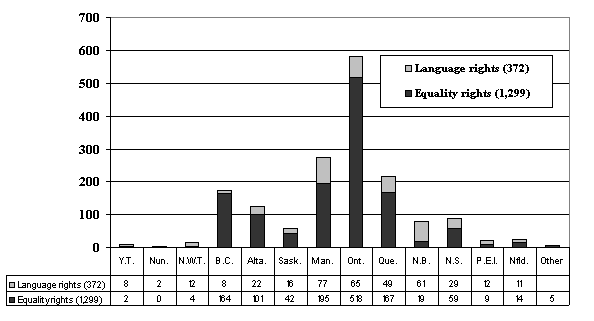LANG Committee Report
If you have any questions or comments regarding the accessibility of this publication, please contact us at accessible@parl.gc.ca.
PROGRAM PERFORMANCE, 1994 TO 2005
From 1994 to 2005, the corporation opened some 1,671 files in response to funding applications. Figure 1 provides the breakdown of files opened by province.
Figure 1 — Financial assistance applications
received by the CCP,
by province and territory, October 1994 to March 2005

Source: Court Challenges Program, Annual Report, 2004-2005, pp. 43 and 50.
The panels approved funding in 1,099 cases (66%). There were 821 files approved relating to equality rights and 278 relating to language rights. A significant number of funding applications approved relating to equality rights fall into six areas: discrimination against Aboriginal peoples (174), general physical disabilities (104), sex (94), race (88) and sexual orientation (75). With respect to language rights, half of the funding requests approved pertaining to language rights involve education rights (143) and, to a lesser extent, language of work, communication and service rights (55).
The CCP was evaluated for the period from 1998 to 2003. The evaluators noted that the CCP is consistent with the objectives of the Department of Canadian Heritage. Most of the individuals and groups consulted stressed that the CCP provides for the clarification of equality and language rights, and affords greater access to the justice system. Other respondents, however, pointed to the relatively controversial nature of the Program, insofar as it allows groups and individuals to bring lawsuits against their own government.2 The evaluators said they had found “no other country with a similar program.”1 The results of the evaluation also show that the Program, as it is currently structured and operated, funds only cases that protect or advance the language, and equality, rights covered by the program. In other words, the CCP is not a neutral program, insofar as a group or individual who would present legal arguments advocating a restrictive application of these rights will not receive CCP funds.
Conversely, a number of the key informers and organizations consulted would like to see the scope of the CCP expanded so that it could fund provincial court cases related to equality rights. However, few representatives of the federal government indicated that they share that desire.
The vast majority of the people consulted supported the decision to use a third party to deliver the Program. While the current corporation communicates the necessary information to the Department of Canadian Heritage, some of the people interviewed feel that it still lacks transparency.
The individuals and groups benefiting from the CCP are located in all regions of the country and generally come from official language minorities or disadvantaged groups, such as Aboriginal people, women, racial minorities, gays and lesbians, etc. Those generally turned down include groups and individuals who do not represent a historically disadvantaged group, or whose arguments put forward would not advance the constitutional provisions covered by the Program. 3
The evaluation determined that the Program’s overall level of funding ($2.75 million a year) was sufficient to attain its objectives. Other key informants argued however that the funding should be increased because the number of funding applications had increased considerably over the years. A number of key informants also stated that the organization could — and should — try to find other sources of funding.
[1] Summative Evaluation of the Court Challenges Program, 26 February 2003, p. iii.
[2] Ibid, p. 21.
[3] Ibid, p. iii.